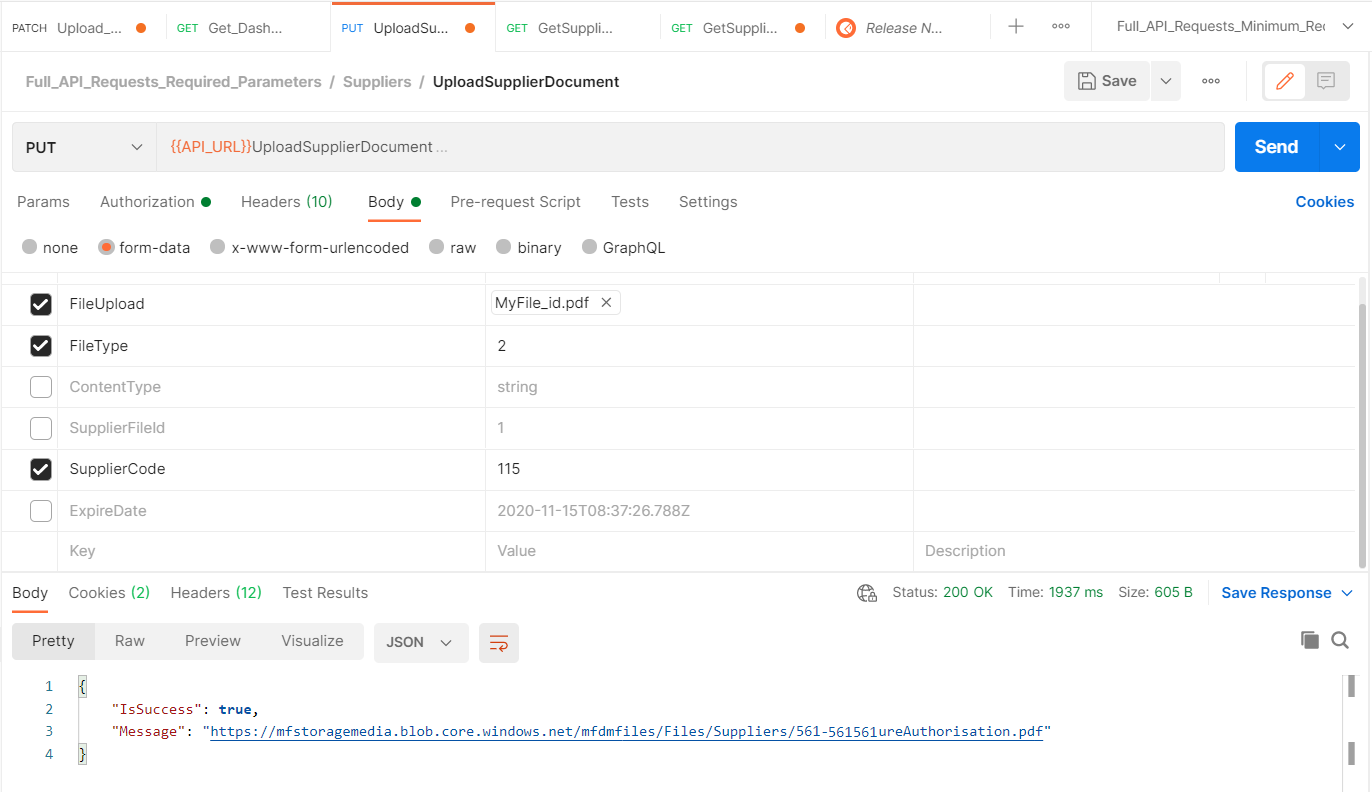UploadSupplierDocument
Endpoint
Overview
The "UploadSupplierDocument" endpoint is a PUT request. It is used to upload supplier documents. Detailed functionality of how to use this endpoint is explained in the Multiple Suppliers section.
The endpoint on Swagger is UpdateSupplierDoc.
Now, we are going to declare the endpoint and its models along with each accepted parameter and possible value.
Request Header
Add "Authorization": "Bearer {Token}" to request header. Token of demo configuration can be found here.
Request Model
The request is a PUT request with the following parameters:
| Input Parameter | Type | Description |
|---|---|---|
| FileUpload | HttpFile Model | |
| FileType | integer | 1 for Civil Id 2 for Commercial License 3 for Articles of Association 4 for Signature Authorization 5 for Others 6 for Civil Id Back 7 for Instagram 16 for Civil Ids Of All Owners 17 for Civil Id Of Manager 20 for Commercial Register 21 for Bank Account Letter 25 for Website 26 for 3rd Parties 27 for Basic regulations list (For charities only) 28 for Board of Directors Agreement (For charities only) 30 for National address |
| ExpireDate | string, optional | |
| SupplierCode | integer |
HttpFile
| Input Parameter | Type | Description |
|---|---|---|
| FileName | string, optional | |
| MediaType | string, optional | |
| Buffer | string, optional |
Response Model
| Response Field | Type | Description |
|---|---|---|
| IsSuccess | boolean | "true" or "false" indicating the status of your request. |
| Message | string | The message response associated with the request done. |
Sample Message
The request below is an example of the form-data object.

Accepted Files
Kindly make sure to upload the file according to the following conditions:
- Maximum File Size: 5 MB
- File Type is in the following formate: .jpg|.jpeg|.png|.bmp|.gif|.xls|.xlsx|.pdf|.doc|.docx
Sample Code
<?php
/* For simplicity, check the PHP Library here: https://myfatoorah.readme.io/php-library */
/* ------------------------ Configurations ---------------------------------- */
//Test
$apiURL = 'https://apitest.myfatoorah.com';
$apiKey = ''; //Test token value to be placed here: https://myfatoorah.readme.io/docs/test-token
//Live
//$apiURL = 'https://api.myfatoorah.com';
//$apiKey = ''; //Live token value to be placed here: https://myfatoorah.readme.io/docs/live-token
/* ------------------------ Call UploadSupplierDocument Endpoint ------------------- */
//Fill POST fields array, check https://myfatoorah.readme.io/docs/upload-supplier-document#request-model
$file = ''; //file url
$contents = file_get_contents($file); //read file using upload form or any way you like
$fileName = basename($file);
$mediaType = mime_content_type($file);
$buffer = base64_encode($contents);
//optional set expire date
$ExpireDate = new \DateTime('now', new \DateTimeZone('Asia/Kuwait'));
$ExpireDate->modify("+365 day");
$postFields = [
//Fill required data
'FileUpload' => [
'FileName' => $fileName,
'MediaType' => $mediaType,
'Buffer' => $buffer
],
'FileType' => 2, //check FileType values in documentationFileType
'SupplierCode' => 3,
//Fill optional data
//'ExpireDate' => $ExpireDate->format('Y-m-d\TH:i:s')
];
//Call endpoint
$link = uploadSupplierDocument($apiURL, $apiKey, $postFields);
//Display the result
echo "Click on <a href='$link' target='_blank'>$link</a> to see the uploaded file.";
die;
/* ------------------------ Functions --------------------------------------- */
/*
* Upload Supplier Document Endpoint Function
*/
function uploadSupplierDocument($apiURL, $apiKey, $postFields) {
$json = callAPI("$apiURL/v2/UploadSupplierDocument", $apiKey, $postFields, 'PUT');
return $json->Message;
}
//------------------------------------------------------------------------------
/*
* Call API Endpoint Function
*/
function callAPI($endpointURL, $apiKey, $postFields = [], $requestType = 'POST') {
$curl = curl_init($endpointURL);
curl_setopt_array($curl, array(
CURLOPT_CUSTOMREQUEST => $requestType,
CURLOPT_POSTFIELDS => json_encode($postFields),
CURLOPT_HTTPHEADER => array("Authorization: Bearer $apiKey", 'Content-Type: application/json'),
CURLOPT_RETURNTRANSFER => true,
));
$response = curl_exec($curl);
$curlErr = curl_error($curl);
if ($curlErr) {
//Curl is not working in your server
die("Curl Error: $curlErr");
}
$error = handleError($response);
if ($error) {
die("Error: $error");
}
return json_decode($response);
}
//------------------------------------------------------------------------------
/*
* Handle Endpoint Errors Function
*/
function handleError($response) {
$json = json_decode($response);
if (isset($json->IsSuccess) && $json->IsSuccess == true) {
return null;
}
//Check for the errors
if (isset($json->ValidationErrors) || isset($json->FieldsErrors)) {
$errorsObj = isset($json->ValidationErrors) ? $json->ValidationErrors : $json->FieldsErrors;
$blogDatas = array_column($errorsObj, 'Error', 'Name');
$error = implode(', ', array_map(function ($k, $v) {
return "$k: $v";
}, array_keys($blogDatas), array_values($blogDatas)));
} else if (isset($json->Data->ErrorMessage)) {
$error = $json->Data->ErrorMessage;
}
if (empty($error)) {
$error = (isset($json->Message)) ? $json->Message : (!empty($response) ? $response : 'API key or API URL is not correct');
}
return $error;
}
/* -------------------------------------------------------------------------- */
Updated 10 months ago
Did this page help you?
